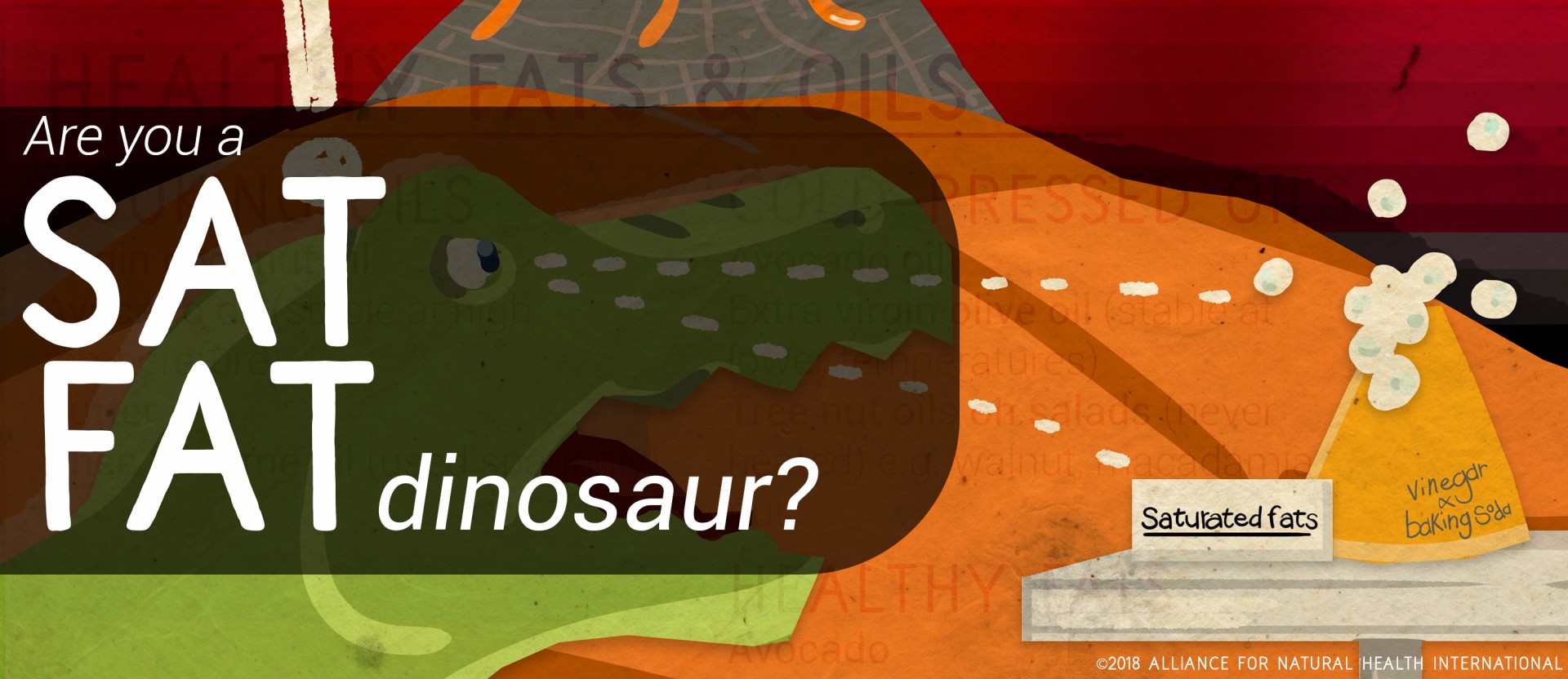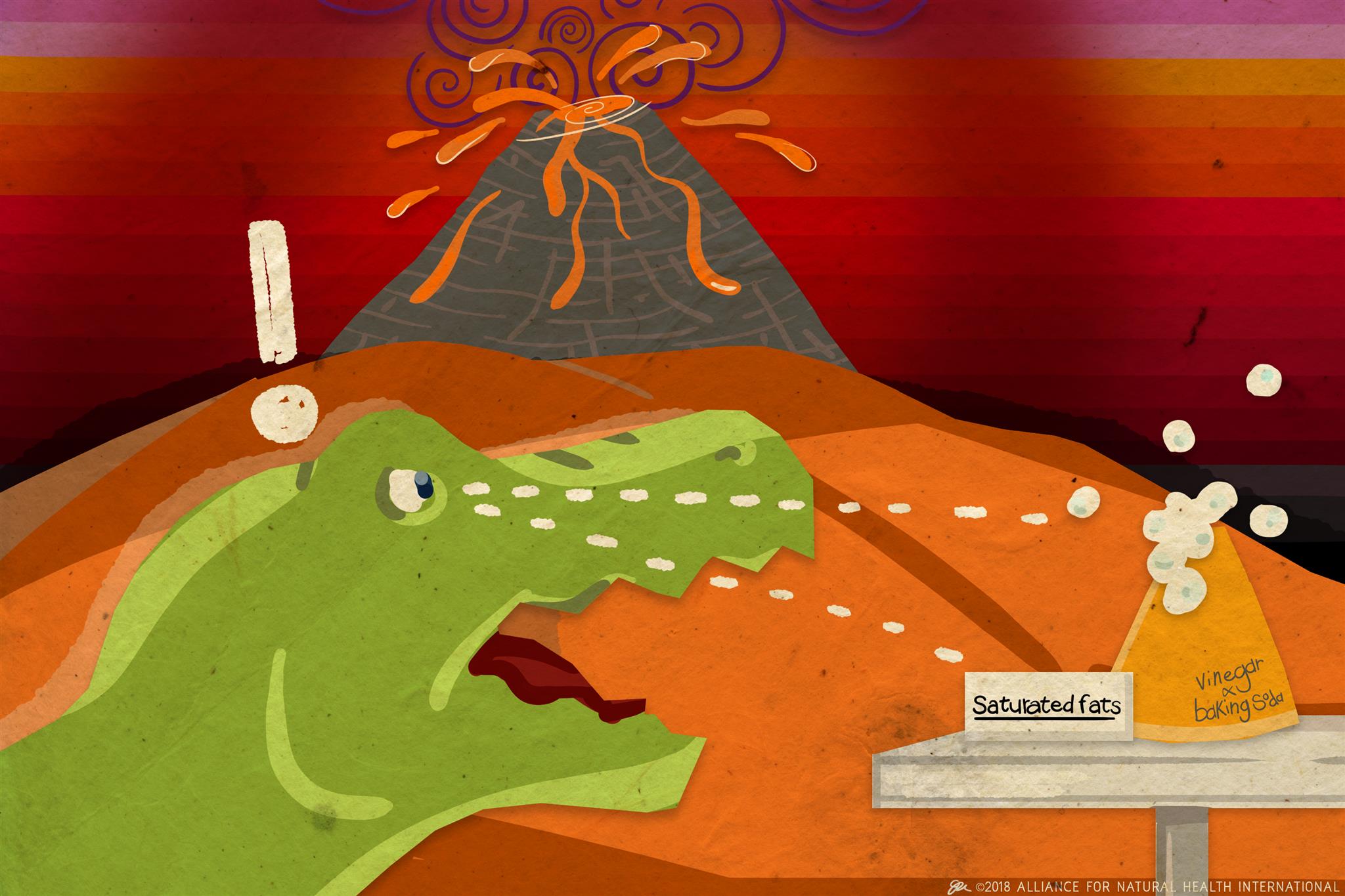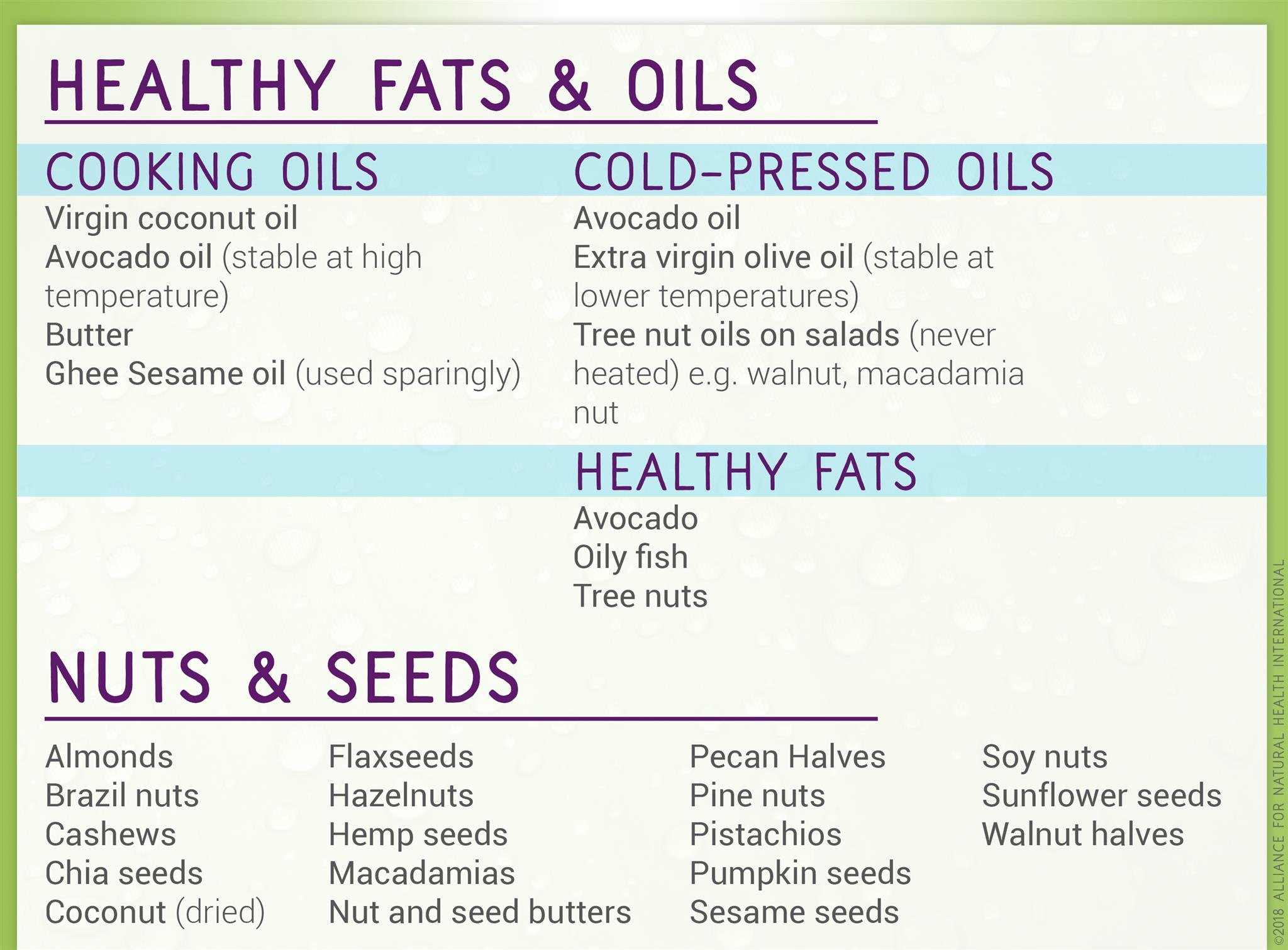Content Sections
Let’s get something straight at the outset: eating fat — not even saturated fat — doesn’t make you fat! That’s despite what you may be reading in the media or being told by your dietitian.
The real demons that are causing waistlines to balloon are our over-consumption of carbohydrates, especially highly processed refined carbs (think sugar, bread, pasta, pizza, cakes…) — along with our pre-occupation with overly frequent snacking and eating. It obviously doesn’t help if you then also spend hours every day not moving – and you also see fit to top up on sugary and junk foods.
OK - diets consistently loaded with some types of fats, such as industrially-created trans fats (e.g. fried or baked foods containing 'hydrogenated' oils), large amounts of polyunsaturated Omega-6 fats (e.g. from refined vegetable oils like soya, sunflower, corn, safflower, etc.) or specific kinds of saturated fats (e.g. palmitic acid from refined palm oil) can be harmful and contribute to chronic diseases especially heart disease in the long-term. But it’s a disservice to fats generally to refer to all saturated fats as ‘bad’, just as it’s misleading to label all polyunsaturated fats ‘good’. Contrary to what some health authorities and dieticians who choose to ignore the currently available evidence are saying (yes, we sometimes think of them as 'sat fat dinosaurs') specific types of saturated fat, such as the lauric acid and the medium-chain triglycerides in virgin coconut oil, or the palmitoleic acid found in whole (but not skimmed) milk dairy products, are just plain good for us - at least in moderation as with most things dietary. And that's what our Food4Health guidelines are all about.
It’s now almost universally accepted that what and how we eat, and what lifestyles we choose, are for the majority of us the most important determinants of our long-term health. What there is less agreement over however – particularly when comparing the views of mainstream health professionals, dieticians, other nutrition professionals and health authorities – is what actually comprises a 'healthy diet'. Consensus is even less when you focus in on the amounts and types of fats considered healthy – or unhealthy.
One of our top tips to help you determine if the health professional offering you nutrition advice is up-to-date with the latest research on nutritional science is by using their view on fats as a barometer. If they tell you to steer clear of all saturated fats and go for low fat or industrially produced polyunsaturated fats from vegetable or seed sources, we suggest you walk away fast. Therein lies a major route to metabolic dysfunction and disease, not health.
Eating fat to get thin – and healthy
Enter Dr Mark Hyman. He's one of the most well-known doctors in the US. He’s known to many as a ten-time No 1 New York Times bestselling author and the physician who reversed Bill Clinton’s heart disease. But his own story that supports his views in his 2016 "Eat Fat, Get Thin" book is far from unique when people switch to 'fat burning':
“For years Dr. Mark Hyman was a vegetarian who kept his intake of dietary fat to a minimum. Whole-wheat bread, grains, beans, pasta and fruits and vegetables made up the bulk of his diet, just as the federal government’s dietary guidelines had long recommended.
But as he got older, Dr. Hyman noticed something that bothered him: Despite plenty of exercise and a seemingly healthy diet, he was gaining weight and getting flabby. At first he wrote it off as a normal part of aging. But then he made a shift in his diet, deciding to eat more fat, not less – and the changes he saw surprised him.
He lost weight, his love handles disappeared, and he had more energy. He encouraged his patients to consume more fat as well, and many of them lost weight and improved their cholesterol. Some even reversed their Type 2 diabetes.”
Fats – our primary evolutionary fuel
Fats, rather than being shunned, ought to be reinstated as our primary fuel source. Fats as we known from food labels yield over twice as much energy as carbs and proteins, 9 kilocalories (kcal) (energy) per gram, as against just 4 kcal per gram for protein and carbs. In reality, fats can be even more efficient than this. It’s worth thinking of that layer of fat we all have beneath our skins as our long-range fuel tank!
Nature has evolved us in such a way to make fats our primary fuel for sustained energy. In our earlier history as hunter/gatherers before the development of agriculture around 12,000 years ago, we actually had very little in the way of simple sugars available to us. But we were very active and our survival depended on us maintaining our energy levels over long periods - often in the absence of food. We did this through eating fats and burning fats, not carbs, for fuel.
Enter Big Food post-World War II, the profits of which have been built on sugary, high calorie, nutrient-deficient snacks and industrially-produced, generally highly processed foods.
Where did it all go wrong?
The US and UK introduced national dietary guidelines in 1977 and 1983 respectively with the ambition of reducing coronary heart disease (CHD) by reducing fat intake. The guidelines obsessed over reducing dietary fat and cholesterol believing these were the primary culprit in heart disease. What the public, the medical profession and dietitians weren’t made aware of was that there were no proper scientific or clinical evidence for these low fat/low dietary cholesterol recommendations. Worse, there has still been no analysis made of the so-called evidence base for those recommendations that have effectively plunged the developed world into a 40-year experiment. An experiment, that we now know from spiralling chronic disease rates and bulging waistlines, has gone horribly wrong.
The lack of evidence behind low fat guidelines was starkly revealed by British obesity researcher and author Zoë Harcombe PhD and colleagues in a ground-breaking paper published in the Open Heart journal in 2015. With today’s knowledge, it’s verging on criminal that these ‘fat myths’ have been allowed to perpetuate whilst big corporates profit and citizens suffer and perish.
Through aggressive lobbying and its sponsorship of the dietetic associations, Big Food has effectively controlled the ‘food agenda’ for industry, government and the medical profession for the last few decades.
Re-tune your metabolism with these safe nutrition steps
- Eat plenty of healthy fats (see above) spread across your meals
- Eat significant amounts of protein-rich animal or plant-based foods (e.g. at every meal), prepared in such a way that it’s not excessively damaged by heat or processing
- Eat low-glycaemic, complex carbs, from vegetables and AVOID all added sugars and highly refined carbs
- Cut out snacking in between meals (leave at least 5 hours between main meals) and focus on 2 to 3 balanced meals every day. But only eat if you’re hungry, which may mean that you drop down to 2 meals per day – and try to avoid snacking unless you’re taking a lot of exercise
- Cook with heat-stable healthy fats like organic extra virgin coconut oil, avocado oil or extra virgin olive oil
- Use plenty of cold-pressed, unrefined extra virgin olive oil on vegetables and salads
- Swap grains (e.g. bread, pasta, rice) for lots of vegetables of multiple colour groups (eat a rainbow)
- Eat plenty of tree nuts (as opposed to peanuts that are legumes) and seeds, these being rich in healthy fats too
- When eating out, make menu choices based on the inclusion of healthy fats and diverse plant foods, with quality animal protein sources if not vegan or vegetarian
- And, provided you’re not vegan or dairy intolerant, stay well away from margarine and go back to enjoying organic butter – guiltlessly!
Even though this way of eating is more in tune with our DNA, the body has to re-learn how to burn fuel in a different way. It helps to transition to a lower carb, higher fat diet over time. Depending on your own metabolic flexibility, this can take one to three months. But please, as you transition, don’t forget to increase your amount and, where appropriate, the intensity, of your physical activity.
Some essential fat-related reading
Coconut oil: miracle wonder food or ‘sat fat’ nightmare
The do’s and don’ts of cooking with olive oil
For fat’s sake, don’t follow those guidelines!
Saturated fat myth busted in British Medical Journal
ANH-Intl Food4Health guidelines and related articles










Comments
your voice counts
03 May 2018 at 12:08 am
Man made vegetable oils are not good. For the same reason refined carbs are bad. It's too refined to get at the fat and getting rid of the rest of the plant. It's the truth.
03 May 2018 at 2:24 pm
The role of governments, conventional medicine, big Sugar, big Ag and big Pharma in creating (through wilful ignorance and the demonisation of fats) today’s metabolic health disaster has been well documented but a little fine tuning re fa(c)ts would not go amiss.
Although sat fats are important for cell membrane stability, fat soluble vitamin absorption and safer higher temperature cooking, they may increase platelet aggregation in those with the relevant SNPs if consumed in excess. There is also the question of lipophyllic toxins being consumed in animal fats especially from those reared by conventional methods. According to Dr Bredesden, when combined with refined carbs and lack of fibre (e.g. cheeseburger, fries and soft drink) saturated fats may be one more step along the way to insulin resistance, CVD and dementia.
03 May 2018 at 5:17 pm
Thanks for your comment, Catherine - we strongly agree!
Expect to see more depth on this topic in future articles
- Charlie
06 May 2018 at 11:20 am
Olive oil is not a stable cooking oil🌿
09 May 2018 at 11:17 am
Hello Chrissie
The key to healthy cooking with olive oil, and minimising damage, lies in keeping the temperature below the smoke point of the oil (below 160C for extra virgin olive oil, and below around 195C for virgin olive oil). Our 2016 article provides more information on using olive oil for cooking whilst maintaining its health benefits - https://anhinternational.org/2016/01/27/the-dos-and-donts-of-cooking-with-olive-and-other-oils/
Warm Regards
Melissa
07 May 2018 at 1:55 pm
Sat. fat is ok unless:
Genetic expression making you a hyper responder or a hyper absorber..
( which can't be ascertained from observations from own diet alone, assuming knowledge base is there )
Has spent a lifetime eating carbs but not a lifetime eating fat.. asking metabolism to switch energy systems efficiently in a relatively short space of time without consequences seems strange?
Let's all be mindful that studies, even those that are approved for publication .( caveat on that too) ..may simply be supporting the next big questionable path.
So what to do? Listen to what is being said then be detached enough to evaluate for yourself what maybe beneficial or detrimental to your health based on your family history, your own illness and / or intolerances history and become very in tune with your own symptoms.
If it sounds too radical it's possibly not right. I'm still of the idea that our metabolism always looks for omeostasis (= balance).
If insulin resistance is the issue, there are diet strategies methods available currently to address that.
Personally I found intermittent fasting beneficial, reducing carbs beneficial, but not necessarily going all out on fat. ( gall bladder issues?).
Learning about how to read labels, not follow blindly what is being said, keeping a level head on everything where there is a lot of intolerance at the moment and red mist.
Being tolerant about others personal diet choices, they might teach you something you don't know about.
If you like plant based and it works for you, go for it likewise being tolerant! about the beliefs of others that come with being plant based and vegan.
Your voice counts
We welcome your comments and are very interested in your point of view, but we ask that you keep them relevant to the article, that they be civil and without commercial links. All comments are moderated prior to being published. We reserve the right to edit or not publish comments that we consider abusive or offensive.
There is extra content here from a third party provider. You will be unable to see this content unless you agree to allow Content Cookies. Cookie Preferences